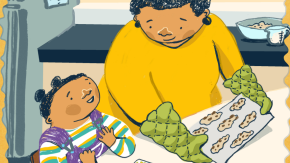
Family courts have an important role to play in breaking cycles of trauma. The Strong Starts Court Initiative shows how.
The Strong Starts Court Initiative is treating family court as an opportunity to help strengthen and repair relationships between parents and their babies and break the cycle of intergenerational trauma.
The cases heard in family courts are some of the most intimate in the legal system. Many of them also involve the most vulnerable among us: the thousands of infants and toddlers who come into contact with the child welfare system each year. The decisions judges make in family court affect these babies and their parents for the rest of their lives.
In cases that involve allegations of neglect or abuse, whether a child will remain with their parent may be one of those decisions. It can feel like an impossible one. Neglect and abuse do lasting harm to a child; but so does separation, which can impact a baby’s emotional, mental, and even physical development.
In family courts across New York, Strong Starts is working to prevent those harms and foster secure, healthy attachment relationships between parents and children aged three and younger. The initiative—which we run in all five boroughs of New York City, Westchester, and now Erie County—brings a focus on infant mental health and early childhood development to family court. It also offers support to parents, who may be experiencing crisis themselves.
Instead of responding to children and parents in isolation, though, Strong Starts does something unique: it focuses on the relationship between them.
The challenges that bring families into the child welfare system are complex and often interconnected. Untreated mental illness, substance use, and trauma are all too common. So are poverty and housing instability. And many parents who find themselves in family court have been through the child welfare system themselves.
That cycle doesn’t affect all communities equally. Black and Brown families are overrepresented in the system, a result of both widespread disinvestment and well-documented racial bias in how abuse and neglect get interpreted and reported.
Family court can contribute to that cycle, but, as Strong Starts shows, it also has the potential to disrupt it. The program places professionals with expertise in infant and early childhood mental health in court to connect families to services that support stronger relationships. Unlike what’s typical in the child welfare system, Strong Starts bases those services on clinical assessments that are sensitive to the ways trauma can be passed down from one generation to the next.
That’s a crucial difference, since, as Misha Wooden from our Strong Starts team notes, “It’s not always clear right away what a family is dealing with that has led them to the system.” As a Clinical Coordinator, she works with families to figure out what their most vital needs are and find services that are right for them. She also supports parents throughout their case as new needs and challenges come up.
“Behaviors that are sometimes seen as anger issues might actually be symptoms of the parents’ own trauma,” says Annamarie Trialonas, Strong Starts’ Clinical Director. And that means, for example, trauma-focused therapy—not anger management classes—could be what a parent needs most in order to begin to heal and provide a more secure attachment base for their child. Apart from individual counseling, the team also connects families with dyadic therapy—which addresses parents and their babies together—as well as group sessions where caregivers can find healing with peers.
But Strong Starts goes beyond just opening a path to services; it also surrounds families with the support they need to stay on that path. Dedicated judges with the program see families once a month, much more frequently than the six-month intervals that are typical in family court. And monthly clinical conferences bring families together with their clinical coordinator, attorneys, service providers, and child welfare representatives to share their progress and address obstacles—which can be as simple as trouble getting to and from appointments.
That regular communication puts an added layer of support under families who might otherwise slip through the cracks and risk being labeled non-compliant. A recent evaluation found that families who get access to Strong Starts are significantly less likely to be separated than those who face a more traditional court process.
What would happen if our systems no longer looked at parents and their children as separate from each other? When we recognize that many parents in family court once sat in the same place their babies do now, we can start to provide resources and support to nurture the connection between them. In courts across New York, Strong Starts is showing the power of that approach.
Header image: "Maya's Homes" from the Child Victims and Witnesses Support Materials

